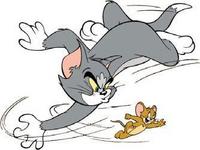
Tom, Jerry and Our Children
An Article in Kabbalah Today Issue 13
Today, even Tom can’t help us teach good values to our children. Not to mention Jerry…
Modern psychological research shows that a child’s cognitive development and patterns of behavior begin to form very early on. The acclaimed Swiss psychologist, Jean Piaget, showed that soon after birth, a baby begins to learn through observation, adopting mental concepts from the environment. The incoming sensory data that the child receives, even as a toddler, has a major effect on his development. Later on, the child only continues developing and perfecting what he had absorbed from his surroundings during the early years.
In light of this, just imagine how sophisticated we must be in order to give our children the right examples, literally from the age of zero. On the other hand, how can we give our children positive examples when even the children’s entertainment industry feeds them countless negative values and images?
To cite just one example, here is the latest description of Tom and Jerry, as it appears on the Cartoon Network website: “Tenacious cat Tom is forever on the tail of his elusive nemesis, Jerry the mouse, and no tricks, traps or cast-iron frying pans will stop him in his timeless pursuit.” And that, dear parents, is what our toddlers learn from.
But apparently, our children are not the only victims of their environment. Society doesn’t ask any of us, “What would you like to want?”—it rather dictates to us what to want, from dawn to dusk. Whether it’s Coca Cola, Nike, iPod or Benz—“you just gotta have it!” But when it comes to our children’s education, it’s up to us, the parents, to choose the values and patterns of behavior that will influence our children.
The Oldies and the Newbies
Take a look at the games our children play or the movies they watch. Chances are, you’d be hard pressed to find even one cartoon that doesn’t use elements of violence, scorn and degradation. There will always be someone who suffers—and someone who enjoys it. Systematically, the cartoons’ plots revolve around the pleasure derived from deriding and abusing one or more of the characters.
On the other hand, think of the oldies—they, at least, had a touch of goodness. So what happened? Let’s go back to our beloved Tom and Jerry: They started off with the tiny, likeable mouse struggling to escape the big, bad cat, who was always eventually punished for trying to pick on the harmless creature. But over the years, along with the scriptwriters’ steadily growing egos, the little mouse also gained some nerve. Today, he’s a real snake, plotting how to best snare the sleepy, silly cat, and revels in making that cat suffer! Anything less than that is already boring for the mouse, and for us, too.
Time to Grow Up
The fact is that this is how we were created—as self centered creatures. However, today, nature demands that we grow up. Even as we keep encouraging our egoistic tendencies, reality is forcing us to realize that we are all part of one, big, integrated whole, and we have to start acting like it. Otherwise, we won’t survive the 21st century.
For millennia, Kabbalists have been telling us that Nature’s higher law is one of love, reciprocity and unity. But even more vital for us to know is that the law of Nature treats us the same way we treat our children: When they are young, it’s OK for them to make mistakes, but when they grow bigger, they have to learn how to play by the rules.
So today, let’s do ourselves a favor and start changing our values, if not for ourselves, at least for our children.
* Read this article in Kabbalah Today Issue 13
View/Download Kabbalah Today Issue 13:
* E-Version
* PDF Version
* MS Word Version
Click Here to Sign Up for a Free Kabbalah Introductory Course – Starts Soon!
